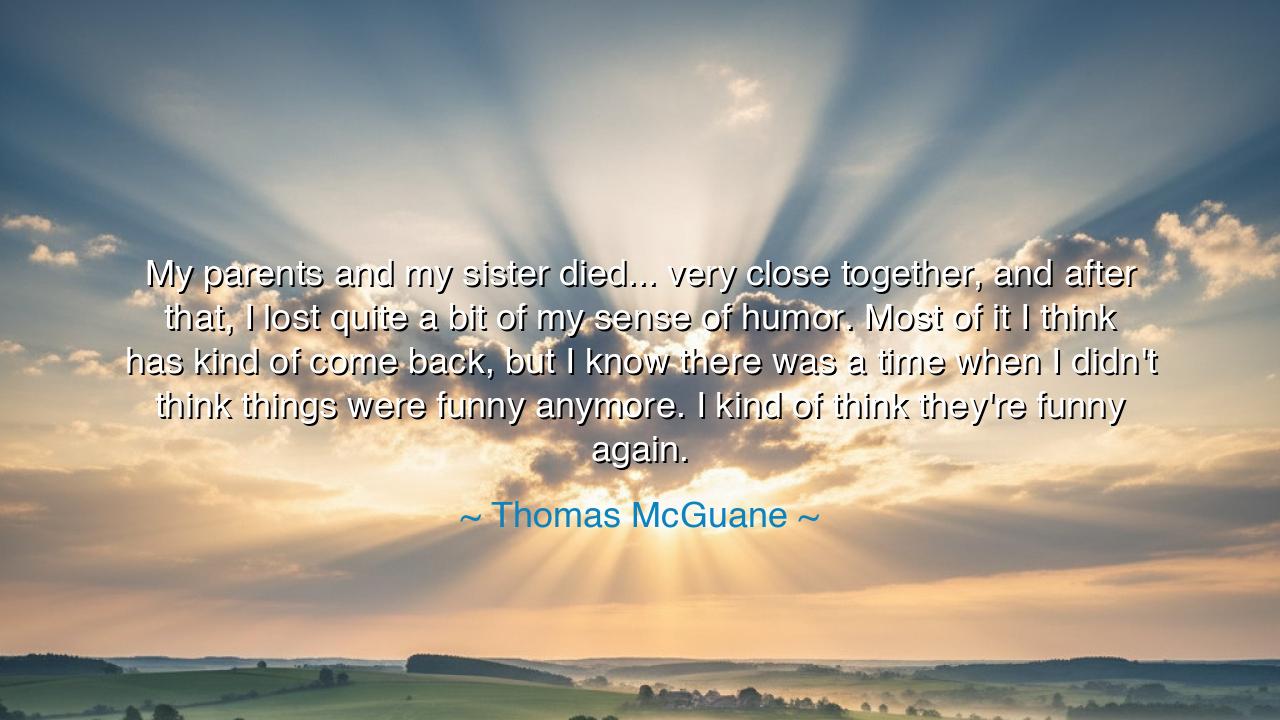
My parents and my sister died... very close together, and after
My parents and my sister died... very close together, and after that, I lost quite a bit of my sense of humor. Most of it I think has kind of come back, but I know there was a time when I didn't think things were funny anymore. I kind of think they're funny again.






The words of Thomas McGuane—“My parents and my sister died... very close together, and after that, I lost quite a bit of my sense of humor. Most of it I think has kind of come back, but I know there was a time when I didn't think things were funny anymore. I kind of think they're funny again.”—speak with the quiet gravity of one who has walked through the valley of loss and found his way, slowly, back toward light. Beneath their simplicity lies a truth ancient and profound: that grief and laughter are not enemies, but phases of the same eternal rhythm. McGuane, a novelist and storyteller of the American West, speaks here not merely of mourning, but of resurrection—the long, fragile return of joy after the heart has been broken.
When he says he “lost his sense of humor,” he names a sorrow that many have felt but few can express. For laughter is not only sound—it is spirit, the living proof of one’s connection to life. In losing it, McGuane did not merely stop smiling; he lost the thread that binds the living to meaning. The ancients knew this truth well: that when tragedy strikes, the world’s colors dim, the music falls silent, and even beauty feels like betrayal. But just as winter is not the death of the earth but its preparation for spring, so too is grief not the end of laughter—it is its dark seed.
His confession, “I kind of think they’re funny again,” carries a quiet triumph. There is no boasting in it, no defiance. It is the soft acknowledgment of healing—a whisper from the soul that life, once again, has begun to stir. In these few words, McGuane embodies the eternal cycle that all who suffer must walk: the descent into pain, the silence of endurance, and the slow, uncertain ascent back to joy. Laughter, when it returns, is no longer careless—it is sacred. It carries the weight of what was lost and the strength of what survived.
There is an ancient story from the East that mirrors McGuane’s wisdom. Buddha, before enlightenment, witnessed the suffering of sickness, old age, and death, and was shattered by it. For a time, he renounced pleasure and joy, believing that to laugh was to dishonor suffering. But when he sat beneath the Bodhi tree, and the dawn of truth broke over him, he understood that laughter and sorrow are not opposites—they are partners in awakening. The tears of grief carve the vessel that later holds the wine of joy. And when he smiled again, it was not the laughter of ignorance, but of compassion—one that knew the price of peace. So it is with McGuane’s return to humor: his laughter is not naïve, but wise; not shallow, but born from depth.
In this, McGuane teaches that the human spirit is resilient beyond comprehension. Grief may silence joy for a time, but it cannot extinguish it forever. Even in the darkest hour, somewhere deep within, the seed of humor waits. It does not mock loss, but redeems it. For to laugh again after sorrow is to declare that love, though wounded, still lives. It is to say: I have walked through the fire and still see light. The one who laughs after suffering does not laugh because the pain is gone, but because he has learned to carry it without letting it crush his heart.
From his words, we draw a lesson both simple and profound: healing is not forgetting. You will not emerge from grief unchanged, nor will laughter return as it once was. But it will return—softer, truer, more compassionate. When loss steals your joy, do not despair; the silence is only part of the song. In time, life itself will whisper reminders of its strange beauty—through the warmth of sunlight, the kindness of a friend, or the absurdity of existence. And one day, without warning, you will laugh again—not in defiance of pain, but in harmony with it.
So let this teaching be carried in your heart: laughter after loss is a form of courage. When the world wounds you, allow yourself to grieve. Sit in the silence, honor the pain, and wait. But do not believe that joy is gone forever. Like spring after winter, it will return, and when it does, it will not erase the memory of those you have lost—it will honor them. For to laugh again is not betrayal; it is life continuing its song, and your heart learning once more to dance to it.
Thus, McGuane’s words stand as a gentle testament to endurance. They remind us that time does not heal all wounds, but it does teach us how to live alongside them. And in that living, laughter—fragile, luminous, and human—will find its way back to us, as surely as dawn follows the longest night.






AAdministratorAdministrator
Welcome, honored guests. Please leave a comment, we will respond soon